Shias Continue to be Persecuted in Pakistan

On October 29, 2016, at least five Shia persons were killed and many injured in a gun-and-bomb attack outside a Majlis in the Nazimabad area of Karachi, the provincial capital of Sindh, in Pakistan, where people had gathered for a religious meeting.
The Lashkar-e-Jhangvi (LeJ) claimed responsibility for the attack. The Sunni supremacist and jihadist militant organisation, whose roots are in the heartland of Punjab province, has a history of carrying out sectarian attacks across Pakistan, particularly against Shia Muslims.
According to data compiled by the South Asia Terrorism Portal (SATP), a total of 2,575 Shias have been killed in Pakistan in 454 targeted attacks since 2001.

The rise in the killings of Shias is a manifestation of perpetual anarchy that has gripped Pakistan. The Shias of Pakistan remain the worst hit.
Militant outfits like LeJ and its extremist allies such as the Tehrik-i-Taliban Pakistan (TTP) along with subtle state support and ideological backing from religious elites, together form the militant troika that has encouraged and thereby sustained the massacre of the Shias. As a consequence, Pakistani society has been poisoned beyond repair.
Shias constitutes nearly 10-15 per cent of the population of Pakistan, and are spread across the country.
The highest concentration is found in the Gilgit Baltistan, where they constitute a majority. The Kurram Agency of the Federally Administered Tribal Areas (FATA) is a Shia stronghold in the tribal belt. Similarly, all urban capitals, namely, Lahore, Karachi, Peshawar and Quetta have sizeable Shia populations.
Sunni militant groups, backed by the authorities at the helm, have sustained a violent campaign against Shia Muslims, particularly since the time of former dictator General Zia-ul-Haq.

Prominent anti-Shia groups include the LeJ, the Ahl-e-Sunnat Wal Jama'at (ASWJ), earlier known as Sipah-e-Sahaba Pakistan (SSP), and the TTP. Despite a government ban on these terrorist organisations, they operate freely and brazenly.
Sunni extremist formations have propagated their violent ideologies with impunity and in the most open manner possible. In June 2011, LeJ distributed pamphlets calling Shias wajib-ul-qatl (obligatory to be killed).
Despite these brazen threats, governments, both at the Centre and in the Provinces, instead of initiating any corrective measures, have taken steps that have worsened the rising graph of attacks against the Shias. No province is safe anymore.
In the past few years, several known militants have been set free by the courts because of the archaic judicial system that is incapable of convicting those involved in the modern-day guerrilla warfare.
The killing of Shias is a manifestation of the existence of an embedded militant troika where three crucial players -- religious heads, militant operators and the state -- work in tandem in massacring the community.




















